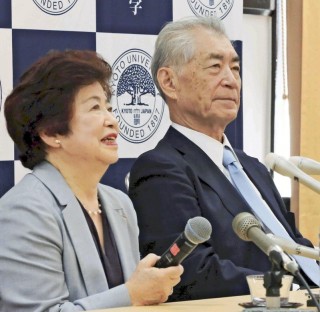Loading
Search
▼ Nobel Prize Winner Honjo Expresses Delight
- Category:Event
KYOTO (Jiji Press) — Tasuku Honjo, distinguished professor at Kyoto University, said Tuesday that he has led a fortunate life, expressing his delight at winning the 2018 Nobel Prize in Physiology or Medicine.
Honjo, 76, wearing a navy suit and a light blue tie, arrived at the university in Kyoto in the morning and smiled at a secretary of his laboratory as he received a bouquet.
“I pulled myself together and thought about a variety of things,” Honjo said at the beginning of a press conference, also attended by his wife, Shigeko, 75.
Honjo said he was lucky to inherit from his parents a healthy body and a tendency to think about things in depth, to be able to pursue his research when the life science field developed significantly and to benefit from ample research funding.
“I’ve never thought about quitting research,” he said.
Honjo’s steady efforts in basic research opened a new path for cancer treatments. “I’ve proved that it’s not uncommon for basic research to lead to practical applications,” he said.
The scientist pointed to the importance of supporting basic research from long-term perspectives, in order to make Japan a country where young people feel it worth betting their futures on a career in science.
“Science is an investment in the future,” Honjo said. “We’ll fall behind if money is just spent on fields that have proved lucrative.”
Honjo shared the prize with U.S. scientist James Allison, which recognized their discovery of cancer therapy by inhibition of negative immune regulation.
Honjo described himself as a bossy husband who does not help with household chores. “I thank my family,” he said.
“He doesn’t give up on anything,” Shigeko said. “Even if it’s just a chat at home, he won’t leave it half done. I believe this attitude helped him win the prize.”
Honjo, 76, wearing a navy suit and a light blue tie, arrived at the university in Kyoto in the morning and smiled at a secretary of his laboratory as he received a bouquet.
“I pulled myself together and thought about a variety of things,” Honjo said at the beginning of a press conference, also attended by his wife, Shigeko, 75.
Honjo said he was lucky to inherit from his parents a healthy body and a tendency to think about things in depth, to be able to pursue his research when the life science field developed significantly and to benefit from ample research funding.
“I’ve never thought about quitting research,” he said.
Honjo’s steady efforts in basic research opened a new path for cancer treatments. “I’ve proved that it’s not uncommon for basic research to lead to practical applications,” he said.
The scientist pointed to the importance of supporting basic research from long-term perspectives, in order to make Japan a country where young people feel it worth betting their futures on a career in science.
“Science is an investment in the future,” Honjo said. “We’ll fall behind if money is just spent on fields that have proved lucrative.”
Honjo shared the prize with U.S. scientist James Allison, which recognized their discovery of cancer therapy by inhibition of negative immune regulation.
Honjo described himself as a bossy husband who does not help with household chores. “I thank my family,” he said.
“He doesn’t give up on anything,” Shigeko said. “Even if it’s just a chat at home, he won’t leave it half done. I believe this attitude helped him win the prize.”
- October 4, 2018
- Comment (0)
- Trackback(0)


